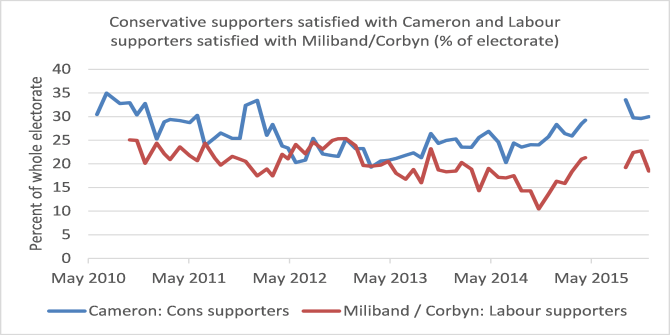

 Drawing on the first major independent study of benefit sanctions, support, and behaviour change, Sharon Wright, Sarah Johnsen, and Lisa Scullion write that not only do sanctions not help move people into work, they also have a detrimental effect on their lives. This is because sanctions push recipients further into poverty and cause significant distress in the process, with potentially life-changing negative results.
Drawing on the first major independent study of benefit sanctions, support, and behaviour change, Sharon Wright, Sarah Johnsen, and Lisa Scullion write that not only do sanctions not help move people into work, they also have a detrimental effect on their lives. This is because sanctions push recipients further into poverty and cause significant distress in the process, with potentially life-changing negative results.
Introduction of the UK’s harshest ever social security sanctions regime in 2012 reinforced a dramatic upturn in sanctions. In 2012-2013 alone, ‘more people received a benefit sanction than a fine in the criminal courts’. While this ‘great sanctions drive’ is a defining feature of Conservative-led social reform, the ‘big stick’ version of welfare conditionality was not tested before its application. Here we present evidence that sanctions are harmful and ineffective in moving benefit recipients into sustainable employment.
The problem(s) with sanctions
Sanctions remove benefit income from recipients who break the rules, but ‘the rules’ can lack legitimacy. For example, in the case of jobseekers, vacancies might simply not exist in local labour markets or there may good cause for non-compliance, including illness. At the same time, sanctions can be ambiguous and vary according to work coach discretion or interpretation. Penalties also tend to outweigh the ‘crimes’, such as payments being stopped for four weeks because a claimant missed a Jobcentre Plus appointment. Overall, sanctions can be imposed for up to three years or indefinitely, for reasons such as non-participation in employability schemes.
That the reach of sanctions now includes disabled people and carers of young children, means problems with the current regime are far from a minority concern. Under Universal Credit (UC), the routine threat of sanctioning has been extended to a degree that is unprecedented globally: such threats have become an immediate and core feature of the social security system for working age claimants, most of whom are compliant; sanctions also now reach not only unemployed people but partners of recipients, carers, disabled people, lone parents, and, bizarrely, low paid workers who claim UC instead of tax credits. UC roll-out is expected to extend the reach of sanctions to up to 7 million families.
The consequences of sanctions
In our research – based on in-depth interviews with 52 policy stakeholders, 27 practitioner focus groups, and 1082 qualitative interviews with welfare service users – we found that sanctions were unhelpful in moving people into work. Instead, even the threat of sanctions created unmitigated distress that got in the way of finding work and had potentially life-altering negative consequences.
The threat or experience of benefit sanctions failed to improve job outcomes for those we spoke to, while their pervasiveness caused anxiety, low mood, and depression. Most were afraid that any minor slip-up or misunderstanding could lead them to crisis point:
It’s not only losing benefit, as in losing money for your food and that, I’d lose my house as well. (Kevin, UC Recipient)
Usually, receiving benefits means living in poverty, often exacerbated by factors like the lengthy UC waiting period, which causes and worsens hardship, debt, and rent arrears. Adding the financial burden of living for a month or more (up to three years or indefinitely in the current legislation) without money for essentials tipped those we spoke to into unmanageable debt, with long-lasting financial consequences that low-paid work could not ameliorate.
[My gas and electricity] fell into that much arrears… I was without heating for ages… I pawned everything I had… You’re literally going: ‘Do I eat or do I have light?’. (Linda, Lone Parent)
Sanctions had serious impacts on mental and physical health, worsened existing conditions, and caused new health problems. These impacts were out of all proportion to the often very minor indiscretions that triggered them (e.g. missing an appointment). Many felt angry, hurt, and resentful about what they considered to be inhumane and unjust treatment:
They’re coming down too hard on the wrong people. (Amy, Jobseeker)
The effects of sanctions pushed several people to breaking point and rippled out to families and communities, who often provided money and/or food that they themselves could ill afford to share. Many resorted to using foodbanks, including one man who was claiming UC whilst in work; others went without food, and several were threatened with eviction or became homeless as a result. There were multiple accounts of those affected resorting to survival crime and suicide attempts.
Sanctions were disempowering and created new barriers that prevented or hindered constructive action, e.g. not being able to afford to look for work or pay for children to get to school, losing confidence and self-esteem:
The sanctions, I think, have held me back from being able to go and look for work… I wasn’t able to get out and look for work further away, but if I wasn’t sanctioned I would’ve been able to look for work in [nearby city]. (Alan, UC Recipient).
Conditionality was counterproductive, pushing recipients to spend large reserves of time and energy complying with onerous job-search or preparation requirements that did little if anything to enhance their prospect of gaining work. Many reported being put under pressure to apply for inappropriate jobs:
It’s demeaning for me to actually do that, apply for jobs that I know I’m not going to get. That if I did get to the interview stage I would go to the interview and say: ‘Oh by the way, I can’t do this job because I can’t work round my children. (Chris, lone parent)
The way forward
Fundamental reform of conditionality and sanctions is both urgent and necessary. It is crucial that the system is changed in positive ways, based on evidence. Key and urgent reforms include:
- To recognise and build on the existing high levels of intrinsic motivation to find and sustain paid work. Those we spoke to did not need to be threatened to look for work: they were already keen to work. Sanctions are inappropriate and disproportionate for many people, such as those in work, households with children, and ill and disabled people.
- Support part-time work. It is essential that the sanctions system is reformed to offer standard protections for part-time working hours for unpaid carers, including parents with primary childcare responsibilities, rather than assuming a full-time model of work that means part-time arrangements must be negotiated in power-infused discretionary conversations.
- Don’t sanction people for various deficiencies of the labour market. Currently, the sanctions system coerces claimants into regularly applying for unsuitable jobs they have little chance of getting because local labour markets are incapable of delivering vacancies for all who want to work. The system therefore needs to be changed to remove sanctions where local labour markets offer insufficient vacancies.
Without a major rethink, millions of claimants (both in and out of work) are likely to continue to experience the adversity that the threat of sanctions brings. Fear of sanctions is set to drive fervent, but often counterproductive compliance with ineffective interventions at the cost of more meaningful work-orientated or life-enhancing activities. Those who receive sanctions may face avoidable crises relating to worsening mental and physical health, poverty, hardship, unmanageable debt, insecurity or eviction. This also holds a potent political risk since resentment is set to grow:
I hate them for it (David, UC Recipient).
___________
 Sharon Wright is Senior Lecturer in Public Policy at the University of Glasgow.
Sharon Wright is Senior Lecturer in Public Policy at the University of Glasgow.
 Sarah Johnsen is a Professorial Fellow in the Institute for Social Policy, Housing and Eqaulities Research (I-SPHERE) at Heriot-Watt University.
Sarah Johnsen is a Professorial Fellow in the Institute for Social Policy, Housing and Eqaulities Research (I-SPHERE) at Heriot-Watt University.
 Lisa Scullion is Reader in Social Policy and Associate Director at the Sustainable Housing & Urban Studies Unit in the School of Health and Society at the University of Salford.
Lisa Scullion is Reader in Social Policy and Associate Director at the Sustainable Housing & Urban Studies Unit in the School of Health and Society at the University of Salford.
All articles posted on this blog give the views of the author(s), and not the position of LSE British Politics and Policy, nor of the London School of Economics and Political Science. Featured image credit: Pixabay (Public Domain).








This all proceeds from a false premise, That welfare is meant to be fair. The purpose of welfare was to stave off social revolution.
The welfare state and NHS essentially was sen by real socialists as opposed to reformists as, the ‘redistribution of poverty among the workers’ from those without to those with dependants, maintaining a sufficiently healthy and efficient working population, keeping unemployed workers from becoming unemployable, and insuring the capitalist class against working-class discontent.
For the capitalist parasite class ,the welfare state and the NHS meant increased profits and were seen as ‘a necessary expense of production’.
The illusory hope and future vision of a stable, poverty-free capitalism was shared by many during the war and early post-war years.
It was and still is a nonsense.
Why the Welfare State received cross-party support with Tories accepting its principles and not merely Labour and Liberal Parties is explained by Bruce Bartlett who held senior policy roles in the Reagan and George H.W. Bush administrations:
“Historically, it has been conservatives like the 19th century chancellor of Germany, Otto von Bismarck, who established the welfare state in Europe. They did so because masses of poor people create social instability and become breeding grounds for radical movements…The welfare state was devised to shave off the rough edges of capitalism and make it sustainable. Indeed, the conservative icon Winston Churchill was among the founders of the British welfare state.”
Bartlett’s comments echo what Tory MP Douglas Hogg (later Lord Halisham) said in the debate on the Beveridge Report in the House of Commons in 1943: “Some of my hon. Friends seem to overlook one or two ultimate facts about social reform. The first is that if you do not give people social reform, they are going to give you social revolution….Let anyone consider the possibility of a series of dangerous industrial strikes following the present hostilities, and the effect that it would have on our industrial recovery….” (Parliamentary Debates, 17th February, 1943, Col.1818.).
The proponents of palliatives view the state is a means of class reconciliation and collusion where in reality its intervention, via social reforms, is an attempt to soften the tension of class conflict.
The whole point of sanctions punitive and otherwise is to drive desperate workers into taking on low-waged mac-jobs and being grateful to the parasite class for employing them, under a further illusion that employment is a route out of poverty, when in fact employment reproduces the conditions of relative poverty, by making the rich employer parasites even richer from the surplus value created by their workers.
Capitalism can not be reformed of its inevitable twin concomitants of poverty,relative or absolute and war, by deed or proxy.
Workers worldwide require to organise to abolish waged slavery and private, corporate or state ownership of the means of production and distribution, taking them into a commonly owned, post-capitalist, elite free democracy using delegatory democracy over resources and not governments over people.
An arrangement where production is geared to producing for use of all with free access to the produce by all, “From each according to their ability, to each according to their needs.”..
Excellent explanation👏👏👏
The Tory government is not fit to run a lemonade stand, let alone a country. They need to be deposed as they will only keep on causing more damage.
And of course there is the lost productivity of employers having to sift through mountains of applications a large number of which are not serious.
The jobcentres take absolutely no account of the waste of employer time they engender with their strictures.
Not that I’m employer centric, the thought simply occurred. The whole thing is barbaric and shames us a supposed civilised society.